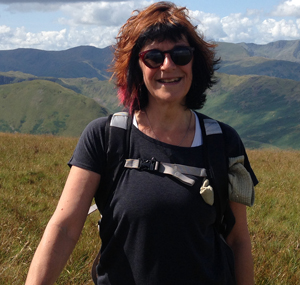
Judy Janec
By Cat Vazquez
When asked about what she does for a living, Judy Janec starts off with an explanation rather than a title. An average day at the office for her can take place anywhere, and at any time, but the assignment is the same: to index video testimonies from Holocaust survivors and witnesses. Often working from her laptop at a café or library, she closely watches the interviews, and using judgment and discretion, assigns key terms to each section of the testimony.
Judy fell into her current role naturally. In one capacity or another, she’s worked on documenting the testimonies of Holocaust survivors for ten years now. Most recently, she was director of Library and Archives at the Jewish Family Services Holocaust Center in San Francisco (JFCS) for the collection she is now helping to index.
Still, grappling with the difficulty of the subject matter can be a challenge. “It doesn’t become easier, but you start to understand the context more, and to develop the ability to not take it in too closely,” she said when asked about how she works with heavy material for hours on each day. “But I’ve definitely heard things I can never ‘unhear’.”
Based in the California Bay Area, Judy works remotely on indexing about 30 hours of testimony each month. She begins her process by laying out the biographical information of each interviewee, taken from documents that accompany the testimonies. She then proceeds with watching through the whole interview, and assigning key words from a vocabulary of Holocaust terminology. The terms indexers assign to the testimonies allow users of the USC Shoah Foundation Visual History Archive (VHA) to search through the available 109,687 hours of testimony from survivors and witnesses of the Holocaust, Rwanda Genocide, and Nanjing Massacre.
“In my work I see so many aspects of an incredibly complex historical event,” said Judy about the stories she’s heard during her time as an indexer. “But everything that happened, happened to one person. These individual stories are key in helping us begin to understand the bigger picture,” she said.
Judy is among seven indexers working through a collection of over 1200 Holocaust testimonies. The collection came from JFCS under the Institute’s ‘Preserving the Legacy,’ wherein the USC Shoah Foundation serves as a repository for outside Holocaust audio-visual archives. Under this project, the Institute partners with other institutions in order to provide access to, and preserve Holocaust collections.
For Judy, this is a rewarding development that she’s been connected to for some time now. She is happy to report that she and her fellow indexers have just reached the halfway mark in indexing the entire collection. She looks forward to the day this collection will become available in the VHA.
“I’m thrilled that one of the oldest Holocaust collections in the country is now being indexed, digitized and preserved, and will soon be widely accessible,” said Judy.
Judy will continue to index the collection until its completion. Thereafter she plans to continue her efforts in the field of oral history of genocide survivors.